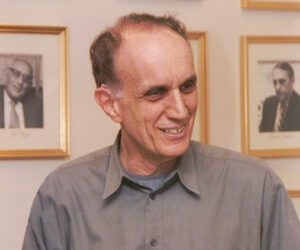International Prize in Statistics Awarded to Stanford’s Bradley Efron
 The International Prize in Statistics has been awarded to Bradley Efron, professor of statistics and biomedical data science at Stanford University, in recognition of the “bootstrap,” a method he developed in 1977 for assessing the uncertainty of scientific results that has had extraordinary impact across many scientific fields.
The International Prize in Statistics has been awarded to Bradley Efron, professor of statistics and biomedical data science at Stanford University, in recognition of the “bootstrap,” a method he developed in 1977 for assessing the uncertainty of scientific results that has had extraordinary impact across many scientific fields.
With the bootstrap, it is possible to simulate a potentially infinite number of data sets from an original data set and—in looking at the differences—measure the uncertainty of the result from the original data analysis.
Made possible by computing, the bootstrap powered a revolution that placed statistics at the center of scientific progress. It helped propel statistics beyond techniques that relied on complex mathematical calculations or unreliable approximations, enabling scientists to assess the uncertainty of their results in more realistic and feasible ways.
“Because the bootstrap is easy for a computer to calculate and is applicable in an exceptionally wide range of situations, the method has found use in many fields of science, technology, medicine and public affairs,” says Sir David Cox, inaugural winner of the International Prize in Statistics.
Cornell University and EPAM Systems Inc. examined research databases worldwide and found that, since 1980, the bootstrap (and multiple variations on the term such as bootstrapping) has been cited in excess of 200,000 documents in more than 200 journals worldwide. Citations are found in fields such as agricultural research, biochemistry, computer science, engineering, immunology, mathematics, medicine, physics and astronomy, and the social sciences.
“While statistics offers no magic pill for quantitative scientific investigations, the bootstrap is the best statistical pain reliever ever produced,” says Xiao-Li Meng, Whipple V. N. Jones Professor of Statistics at Harvard University. “It has saved countless scientists and researchers the headache of finding a way to assess uncertainty in complex problems by providing a simple and practical way to do so in many seemingly hopeless situations.”
“The bootstrap was a quantum leap in statistical methodology that has enabled researchers to improve the lives of people everywhere,” says Sally Morton, dean of and professor of statistics in the Virginia Tech College of Science. “Efron is a statistical poet of enormous beauty, applicability, and impact.”
“The truth is, I didn’t think it was anything wonderful when I did it,” says Efron. “But it was one of those lucky ideas that is better than it seems at first view.” It was a tool many scientists could use, and use easily, especially as personal computing provided the power to do the number crunching. And it worked.
Efron will accept the prize next summer at the 2019 World Statistics Congress in Kuala Lumpur. For more information about the congress, visit the ISI 2019 website.
About Efron
Bradley Efron was born in May 1938 to Russian immigrants and grew up in St. Paul, Minnesota. He credits his salesman father, Miles, for cultivating in him a love of math and science, in part through baseball and bowling scoring. “He kept track of these things,” says Efron, “so I grew up with a lot of numbers around me and that was very helpful—I was training to be a statistician without realizing it.”
He won a national merit scholarship the year it was first introduced and went to Caltech. It was more than an intellectually eye-opening experience. “I’d never seen a mountain or an ocean,” says Efron.
Initially, he thought he was going to become a mathematician, but he realized abstract mathematics was not where his interests or talents lay. Enrolling in a PhD program at Stanford, he switched to statistics. “I remember when going into statistics that first year I thought, ‘This will be pretty easy, I’ve dealt with math and that’s supposed to be hard.’ But statistics was much harder for me at the beginning than any other field. It took years before I felt really comfortable.”
At Stanford, Efron is Max H. Stein Professor of Humanities and Sciences, professor of statistics and professor of biostatistics with the department of biomedical data science in the school of medicine; he serves as co-director of the mathematical and computational sciences program. A recipient of a 2005 National Medal of Science for his contributions to theoretical and applied statistics, especially the bootstrap sampling technique, he was awarded the Guy Medal in Gold by the Royal Statistical Society in 2014. He served in 2004 as president of the American Statistical Association.
Visit Stanford’s website to learn more about Efron.

















